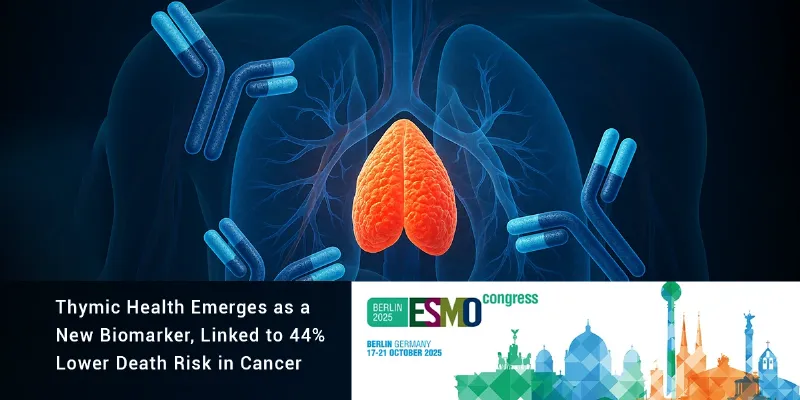AI Analysis of Thymic Health Predicts Immunotherapy Success, Cutting Death Risk by 44%

18 October 2025
A large AI-driven study of 3,476 cancer patients, presented at ESMO 2025, reveals that thymic health is strongly linked to immunotherapy success. Patients with higher thymic scores had a 35% lower risk of disease progression and a 44% lower risk of death, highlighting thymic health as a powerful, non-invasive biomarker for predicting immune response across cancers, including NSCLC, melanoma, and breast.
For decades, oncologists have relied on tumor-based biomarkers, like PD-L1 expression or tumor mutational burden (TMB), to predict which patients might respond to immunotherapy. But these measures tell only half the story. What if the answer lies not in the tumor, but in the immune system itself, specifically, in the thymus, the small gland behind the breastbone that educates T cells?
A new international study, presented at the 2025 European Society for Medical Oncology (ESMO), suggests that the thymus may hold one of the missing keys to immunotherapy response. Using artificial intelligence to analyze thousands of CT scans, researchers found that cancer patients with healthier thymic tissue experienced significantly better outcomes with immune checkpoint inhibitors across multiple tumor types.
Rethinking the Immune Equation
“Immune checkpoint inhibitors have transformed cancer treatment, but responses remain limited in some patients,” said lead author Dr. Simon Bernatz of the AI in Medicine Program at Mass General Brigham, Boston, and noted that current biomarkers for immunotherapy, such as PD-L1 or tumour mutational burden (TMB), focus on tumour characteristics but largely overlook patients’ immune capacity. “Immunotherapy relies on unleashing T cells, and the thymus is where T cells are matured. Our study shows that thymic health is associated with improved immunotherapy outcomes across diverse cancer types.”
In adults, the thymus gradually shrinks and becomes replaced by fatty tissue, a process known as thymic involution. Yet even residual thymic activity can influence immune resilience. The team hypothesized that this overlooked organ might determine how robustly patients respond to immunotherapy.
AI Meets Anatomy
To test their theory, Bernatz and colleagues developed a deep learning algorithm capable of quantifying thymic health from routine chest CT scans. The AI tool assessed features such as thymic size, shape, and tissue density to produce a “thymic health score.” It was then applied to a real-world cohort of 3,476 patients who had received immune checkpoint inhibitors for cancers including lung, melanoma, renal, and breast.
In patients with non–small cell lung cancer (n=1,218), higher thymic health scores correlated with a 35% lower risk of disease progression (HR 0.65; 95% CI, 0.54–0.77) and a 44% lower risk of death (HR 0.56; 95% CI, 0.46–0.68). These associations persisted even after adjusting for PD-L1 expression and TMB—suggesting thymic health offers predictive value beyond traditional tumor biomarkers.
Biological Validation
The team validated these findings using data from TRACERx, a landmark longitudinal study of treatment-naïve NSCLC patients. In 464 participants, T-cell receptor sequencing and plasma proteomics revealed that patients with healthier thymic profiles also had greater TCR diversity and stronger adaptive immune signaling—hallmarks of an immune system ready to respond.
“Thymic health has the potential to enhance patient stratification in precision oncology,” Dr. Bernatz suggested. “Randomised clinical trials will be needed to establish this in clinical practice. But we think thymic health is one of the missing pillars from current cancer biomarker panels and can start bringing the patient’s immune system into clinical decision making alongside established tumour-centred biomarkers.”
A New Biomarker for Precision Oncology
If further validated, thymic health could emerge as a non-invasive, tumor-agnostic biomarker—a window into immune competence that complements tumor genomics.
“We need a prospective study including evaluation of thymic health in patients undergoing immunotherapy,” said Dr Alessandra Curioni-Fontecedro, Professor of Oncology at the University of Fribourg, Switzerland, not involved in the study. However, she noted that the inclusion of a validation cohort added to the study’s quality and that, although thymic health is not routinely assessed, chest CT scans are commonly performed in patients with cancer.











Comments
No Comments Yet!